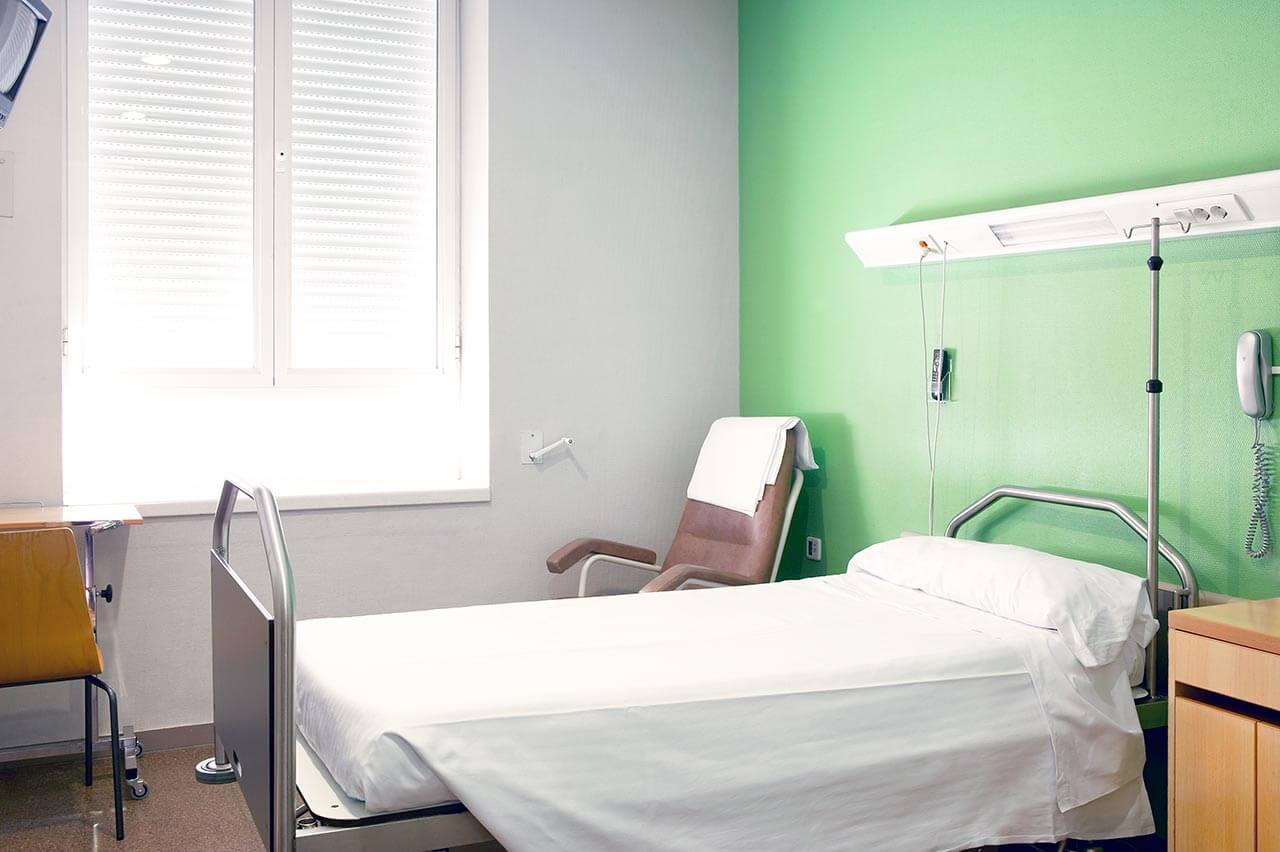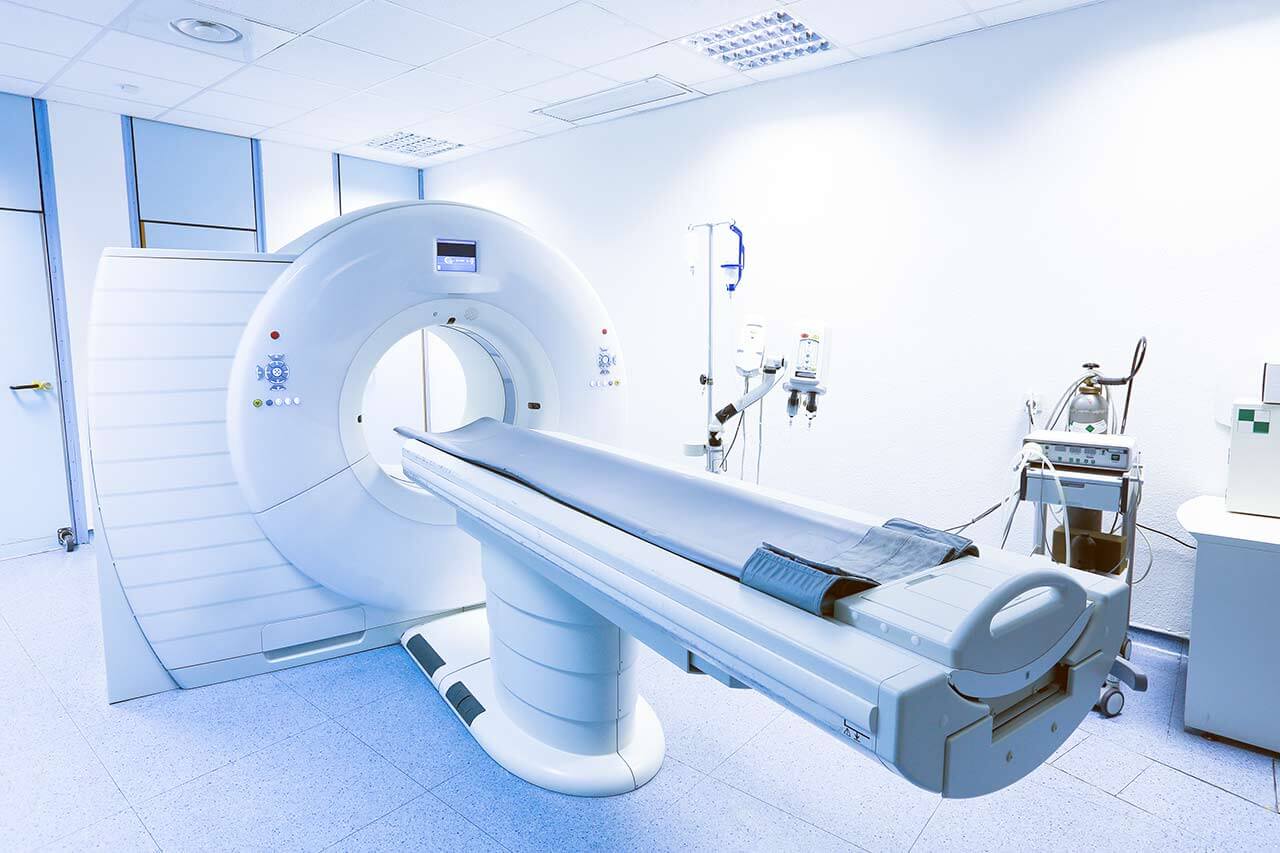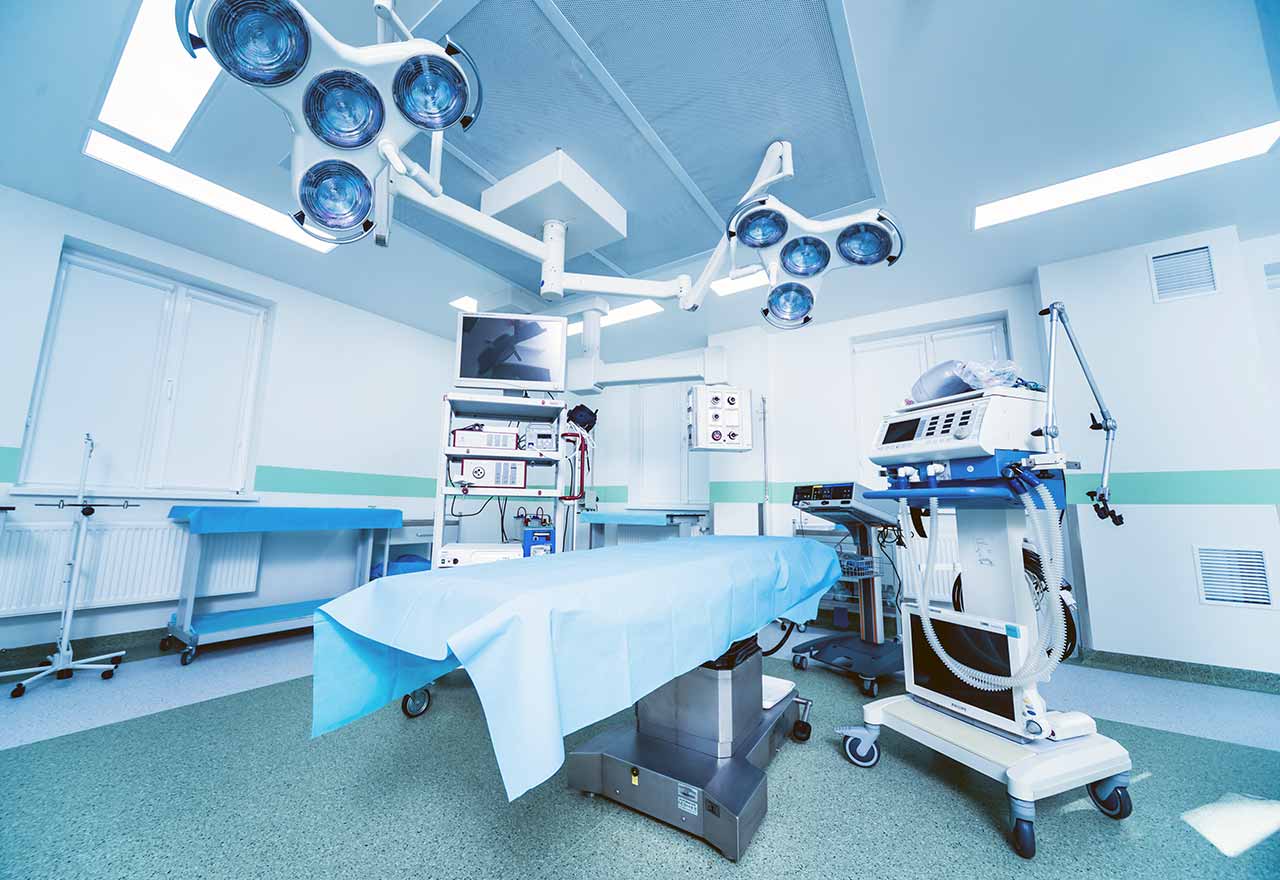

The program includes:
- Initial presentation in the clinic
- clinical history taking
- review of medical records
- physical examination
- laboratory tests:
- complete blood count
- general urine analysis
- biochemical analysis of blood
- TSH-basal, fT3, fT4
- tumor markers
- inflammation indicators (CRP, ESR)
- indicators of blood coagulation
- abdominal ultrasound scan
- CT scan/MRI or PET-CT of abdomen
- preoperative care
- cytoreductive surgery to remove visible tumors
inside the abdomen and HIPEC - histological and immunohistochemical
examination of removed tissues - symptomatic treatment
- cost of essential medicines
- nursing services
- stay in the hospital with a full board
- accommodation in a 2-bedroom ward
- elaboration of further recommendations
How program is carried out
During the first visit, the physician will conduct a clinical examination and go through the results of the available diagnostic tests. After that, you will undergo the necessary additional examination, such as the assessment of liver and kidney function, ultrasound scan and tomography of the abdominal organs. Based on the results of the examination, the physician will choose the surgical technique and the type of anesthesia. After that, preparation according to the preoperative standard will start.
Cytoreductive surgery begins with general anesthesia. The intervention is performed as open surgery, i.e. through the incision in the anterior abdominal wall, so that the surgeon can carefully examine the peritoneum and the surface of the abdominal organs. The surgeon removes affected by the malignant process areas of the rectum and peritoneum, metastases in other internal organs. This stage of the operation can take several hours, since the overall effectiveness of the treatment depends on the completeness of the malignant tissues removal.
At the next stage of the operation, the surgeon inserts several catheters into the abdominal cavity. Through the catheters, a heated solution of a chemotherapy drug is pumped inside. The special system maintains the required temperature (42-43 degrees Celsius), pressure and circulation rate of the medicinal solution. The solution mechanically flushes out blood clots and remnants of malignant tissues, and a heated chemotherapy drug destroys micrometastases in internal organs and lymph nodes (micrometastases can’t be detected by the naked eye).
After 1-1.5 hours, the chemotherapy drug is removed from the abdominal cavity and the abdominal cavity is washed with saline. After that, the surgeon removes the catheters and sutures the incision of the anterior abdominal wall.
After the completion of the operation, you will be transferred to the ward of the intensive care unit, under the round-the-clock supervision of doctors and nurses. In 1-3 days after the operation, your drains will be removed and you will be transferred to a regular ward for further recovery. The whole treatment takes 10-12 days on average.
Finally, the attending physician will evaluate the results of control examinations, schedule the date of discharge from the hospital and give you detailed recommendations for further follow-up and treatment.
Required documents
- Medical records
- MRI/CT scan (not older than 3 months)
- Biopsy results (if available)
Service
You may also book:
 BookingHealth Price from:
BookingHealth Price from:
About the department
The Department of General, Abdominal and Minimally Invasive Surgery at the HELIOS Clinic Krefeld offers the full range of services in these medical fields. The department specializes in the surgical treatment of abdominal organs: esophagus, stomach, small and large intestine, liver, pancreas, gallbladder and bile ducts, thyroid gland. Here are used only proven and sparing surgical treatment methods, which guarantee a rapid recovery of patients. The department is headed by PD Dr. med. Christoph Wullstein.
The specialists of the department have many years of experience and expertise in performing minimally invasive interventions ("keyhole surgery") that help the patient avoid severe pain, prolonged hospitalization, the risk of infection and loss of blood.
The department shows excellent results in the treatment of oncological diseases. It performs successful operations to treat esophageal, stomach, intestinal, liver and pancreatic cancer. The department holds weekly tumor boards, during which gastroenterologists, radiologists, oncologists and radiation therapists jointly discuss each case and develop an optimal treatment plan.
In addition, the department specializes in the diagnostics and treatment of proctologic diseases (hemorrhoids, anal fissures, fecal incontinence, etc.). After a comprehensive diagnosis, the doctor prescribes the necessary course of therapy. Treatment can be both conservative and surgical.
A separate focus of the department is surgical treatment of the endocrine organs. There are performed many operations on the thyroid gland, parathyroid glands, adrenal glands and pancreas.
The department’s scope of tasks also includes the treatment of obesity. Should conservative obesity treatment not yield positive results, the doctors of the department offer safe operations that will help to cope with the problem, for example, sleeve gastroplasty, gastric bypass surgery and others. The operation is preceded by a special individual consultation, during which the doctor informs about the possibility of performing certain interventions and the risks that they may entail.
The range of medical services of the department includes:
- General surgery
- Cholecystectomy (surgery to remove the gallbladder)
- Surgery to treat inguinal, umbilical and incisional hernias
- Surgical treatment of heartburn
- Surgical removal of soft tissue tumors and abscesses
- Port system implantation (for example, for chemotherapy in cancer treatment)
- Proctologic diseases
- Hemorrhoids
- Anal thrombosis
- Anal fissures
- Anal fistulas and anal abscesses
- Coccyx fistulas
- Genital warts
- Rectal prolapse
- Fecal incontinence
- Endocrine surgery
- Thyroid surgery (for example, in malignant diseases)
- Parathyroid surgery (for example, in hyperparathyroidism)
- Adrenal surgery (for example, in benign or malignant neoplasms)
- Pancreatic surgery (for example, in insulinoma)
- Cancer surgery
- Esophageal cancer
- Stomach cancer
- Colon cancer
- Liver cancer
- Pancreatic cancer
- Bariatric surgery
- Sleeve gastroplasty
- Gastric bypass surgery
- Minimally invasive surgery
- Resection of the gallbladder, appendix and adrenal glands
- Surgery to treat inguinal hernias and heartburn
- Resection of the colon and rectum
- Surgery to treat pancreatic and esophageal tumors
- Highly specialized abdominal interventions
- Partial resection of the esophagus in esophageal cancer
- Total or partial resection of the pancreas in pancreatic cancer
- Liver resection for the treatment of liver metastases or liver cancer
- Surgery to treat colon and rectal cancers
- Peritoneal resection with hyperthermic intraperitoneal chemotherapy (HIPEC) in peritoneal cancer and peritoneal carcinomatosis
- And other interventions
Curriculum vitae
- 1986 - 1993 Medical studies, Ruhr University Bochum, Germany.
- 1995 Licence to practice medicine, Germany.
- 1997 Doctorate in medicine, Ruhr University Bochum.
- 1999 Board certification as Surgeon.
- 2002 Board certification as Abdominal Surgeon.
- 2004 Postdoctoral qualification in surgery, Johann Wolfgang Goethe University Frankfurt, Germany. "Risk factors of the non-immunological morbidity following simultaneous pancreas and kidney transplantation in uremic type 1 diabetics".
- 1993 - 1995 Assistant Physician, Department of Bone and Joint Surgery,
- Academic Hospital Remscheid.
- 1995 - 1998 Assistant Physician, Department of General and Thoracic Surgery, Hospital Barmbek, Teaching Hospital of the University of Hamburg.
- 1998 - 1999 Assistant Physician, Department of General, Thoracic and Vascular Surgery.
- 2000 Senior Physician, Department of Transplantation Surgery, University of Rostock
- (Prof. U. T. Hopt).
- 2001 - 2002 Chief Physician, Department of Surgery, Ruhr University Bochum,
- Knappschaftskrankenhaus Bochum-Langendreer
- (Prof. W. O. Bechstein).
- 2002 - 11/2008 Chief Physician, Department of General and Vascular Surgery, Johann Wolfgang Goethe University Frankfurt
- (Prof. W. O. Bechstein).
- Since 12/2008 Chief Physician, Department of General, Abdominal and Minimally Invasive Surgery, HELIOS Clinic Krefeld.
- German Society of Surgery.
- Professional Association of German Surgeons.
- Study Group on Minimally Invasive Surgery.
- Roche Transplantation Award 2003
- 2004 Scientific Award of the Study Group on Gastroenterology, Central Germany.
Photo of the doctor: (c) Helios Klinikum Krefeld
About hospital
Founded in 2014, the HELIOS Clinic Krefeld is one of the most modern medical facilities in Germany today. A team of highly qualified specialists, innovative medical equipment and comfortable accommodation conditions – the clinic has everything to make the treatment run smoothly and efficiently. Having crossed the threshold of the clinic, you will feel the home-like cozy and modern atmosphere. Perhaps you will even forget that you are in the clinic.
As a maximum care medical center, the clinic covers practically all areas of medicine: cardiology, gastroenterology, oncology and hepatology, nephrology, diabetology and rheumatology, general, abdominal and minimally invasive surgery, dermatology and venereology, angiology, cardiac surgery and other medical fields.
Thanks to a continuous fruitful cooperation with the world’s leading universities, research and medical centers, the clinic provides the highest treatment standards.
The doctors of the clinic take up the treatment of the most severe cases, including serious spinal injuries and diseases related to the disorders of the central nervous system. The nursing staff of the clinic regularly undergoes both advanced and special trainings, which contributes to a high-quality, professional patient care at all stages of treatment.
The clinic adheres to a strict quality management system. Not only the patient care, but also the entire treatment process (including monitoring and patient care after the operation) are subject to the quality certification.
Photo: (c) depositphotos
Accommodation in hospital
Patients rooms
The patients of the HELIOS Clinic Krefeld live in comfortable single and double rooms. Each room has a bathroom with a toilet and shower. The room is furnished with a comfortable bed, bedside table, TV, radio and telephone. Each room has access to the Internet, which can be used at extra charge.
The clinic offers an excellent infrastructure: a beautiful park with playgrounds for children, a cafeteria, a chapel, which regularly hosts church services, a prayer room for Muslims, a beauty salon, a shop with a large selection of magazines, drinks and personal hygiene items, an ATM and a large parking lot.
Meals and Menus
The restaurant of the clinic offers three meals a day. For breakfast, lunch and dinner, it serves a large selection of dishes that will please even spoiled gourmets. Every day, the menu features vegetarian and dietary dishes. It is possible to order any dish without leaving the room. In addition, the clinic has a cafeteria where one can always have a cup of aromatic coffee, hot tea or enjoy an exquisite refreshing drink. Also, the cafeteria menu offers many tasty snacks and dishes.
Further details
Standard rooms include:




